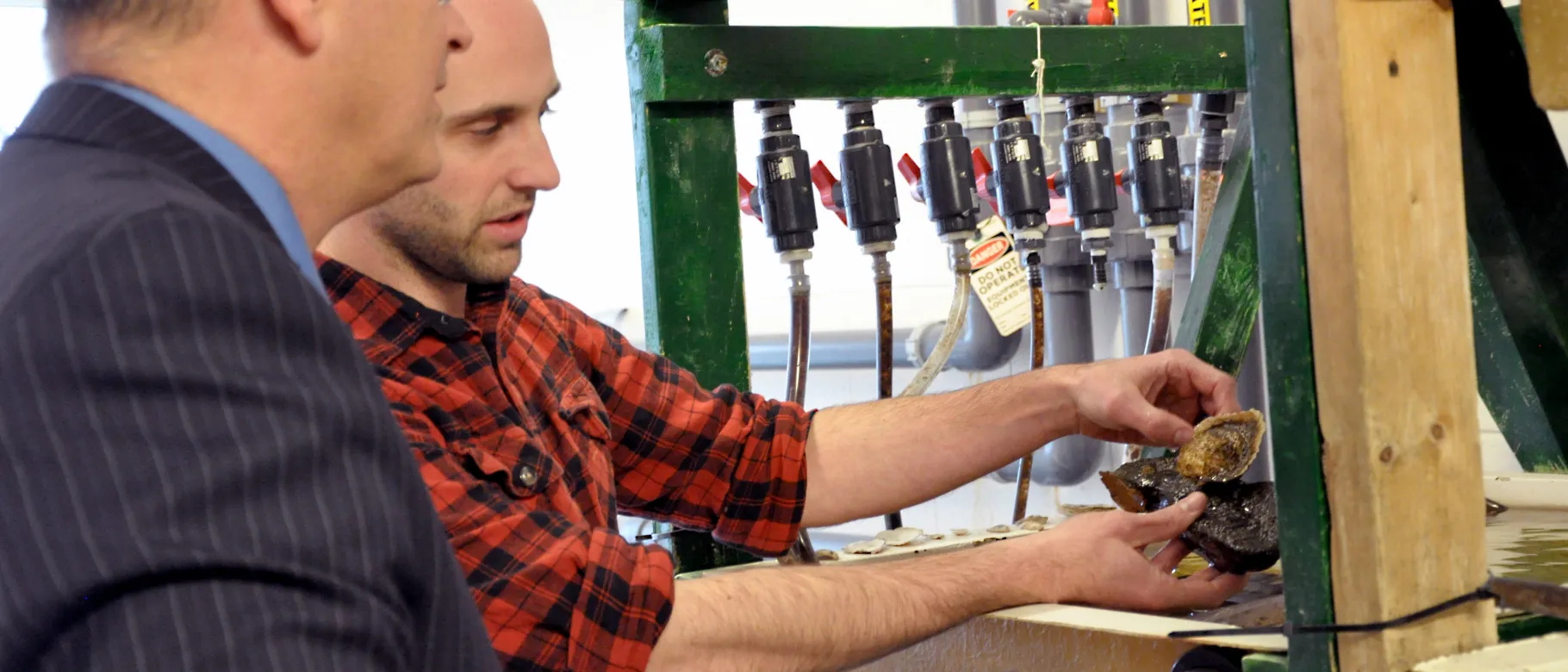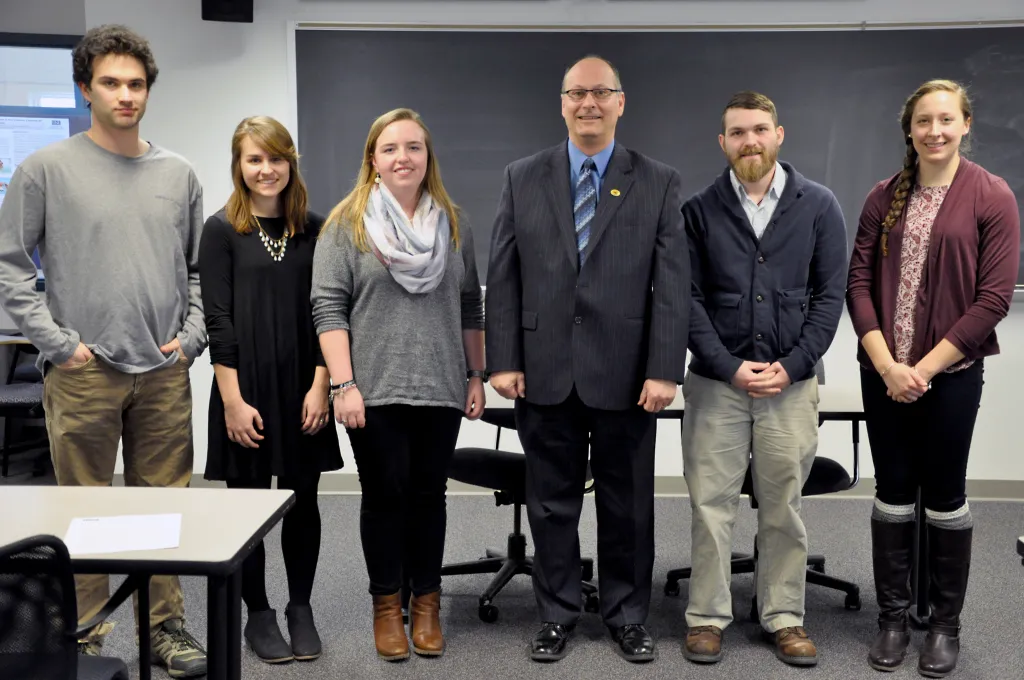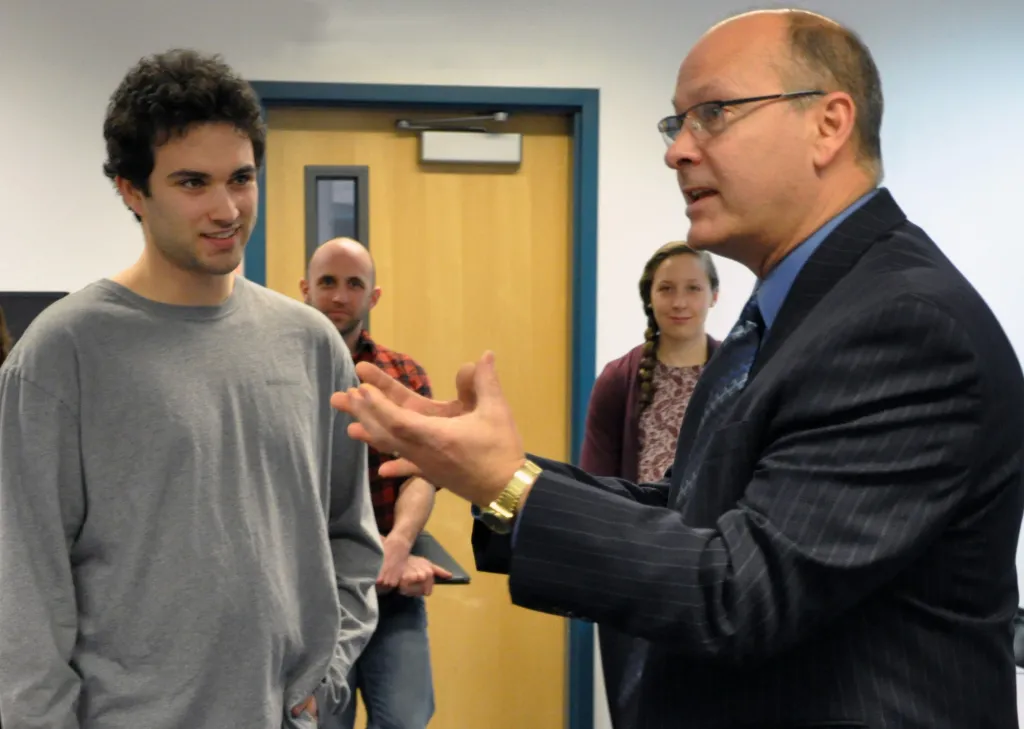Pratt & Whitney visits UNE’s Marine Science Center to view fruits of company’s student research fellowships

On March 4, 2016, five marine sciences students had the opportunity to present their research projects to a representative of the company responsible for making their studies possible.
Jennifer Lutes (’18), Michelle Dufault (’18) and Abigail Hayne (’19), who were recently named Pratt & Whitney Fellows for 2016, along with Michael Galloway, B.S. ’15 and Matthew Scheuer (’16), two of the Pratt & Whitney Fellows from 2015, made presentations to Tom LeBlond, manager of Environmental Health and Safety at Pratt & Whitney during his visit to UNE’s Marine Science Center.
Pratt & Whitney, an aerospace manufacturing company with global service operations, actively supports the development of the next generation of engineers and researchers through various philanthropic efforts. One such effort led to the creation of the UNE Marine Science Center’s Pratt & Whitney Marine Science Research Fellow program.
These interdisciplinary research fellowships recognize top performing UNE students, enabling them to pursue research opportunities in their areas of interest. According to Barry Costa-Pierce, Ph.D., professor and chair of the Department of Marine Sciences and director of the Marine Science Center, applicants must prepare proposals of the same caliber as those that are sent to the National Science Foundation for consideration. The proposals are rigorously judged by a faculty committee.
Members of UNE faculty or research staff in marine biology, ecology, oceanography, marine affairs, policy and governance, marine entrepreneurship or ecological aquaculture serve as the students’ mentors. Jeri Fox, Ph.D., associate professor, who mentored Galloway and Scheuer last year, believes that the Pratt & Whitney Fellowships are instrumental in opening doors for the students who receive them. “Because of the Pratt & Whitney Fellowships, some very bright and motivated students were given the opportunity to test out some very innovative ideas,” she stated.
Lutes, in her presentation, explained her plan to study primary productivity in the region connecting the Pacific and Indian Oceans under the mentorship of Professor Stephan Zeeman, Ph.D. Dufault detailed her proposed research project, to be conducted under the guidance of Research Assistant Scientist Adam St. Gelais, M.S., to test the feasibility of inducing the growth of reproductive tissue in kelp blades in the laboratory and to create a histological, visual guide for kelp farmers and aquaculturists to reference in the future for information on stage and quality of reproductive tissue. Hayne, who is being mentored by Angela Cicia, Marine Sciences laboratory coordinator, described her goal of restructuring and redeveloping teaching labs to be better suited to the needs of students as experiential learners.
Galloway and Scheuer, who began their fellowships last summer, reported on the progress of their research. Galloway discussed his aquaculture engineering project that aimed to improve hydrodynamics through tank optimization. He succeeded in creating a self-cleaning tank. Scheuer showed off the underwater drone that he designed to perform aquaculture monitoring, collect data, measure water quality and take high resolution videos.
LeBlond expressed his pride in the high-caliber work of UNE’s Pratt & Whitney Fellows. “These students are very impressive,” he stated. “They are working with the building blocks of our whole marine world and adapting them for the future through innovative thinking. The quality of their research is remarkable. It’s the kind of quality that UNE stands for and that Pratt & Whitney is proud to have a role in by making the Marine Science Research Fellow program possible at the university.”
LeBlond concluded his visit to UNE with a tour of the Marine Science Center, led by Costa-Pierce.
Pratt & Whitney has been a generous supporter of UNE for three decades. The company’s contributions have included water treatment equipment, a multi-year gift to support the construction of the Alfond Science Center and two gifts to support the Bush Center. More recently, support has been directed to student internships and research in the marine sciences.

